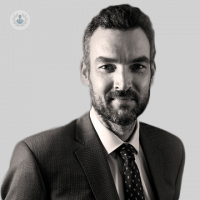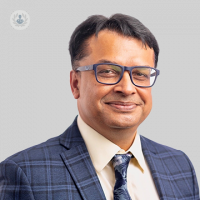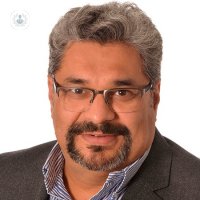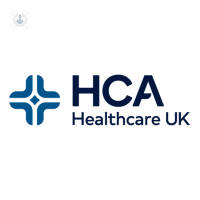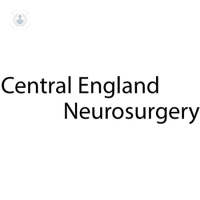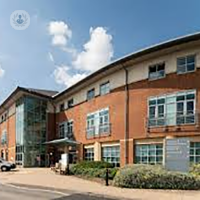What causes arm pain?
Arm pain has a number of causes, including:
- Muscle injury – also known as a strain, generally caused by overexertion
- Ligament injury – also known as a sprain
- Bone fracture – caused by impact or a fall
- Injuries from overuse – some sports or occupations involve using the same muscles and tendons over and over again, leading to the tendons becoming inflamed.
- Nerve compression – sometimes the nerves in your arm can become impressed, perhaps due to injury or the normal ageing process. This can lead to pain and tingling down your arm.
- Cardiovascular issues – shooting arm pain associated with tightness in the chest is often a sign of a heart attack. More generally pain that comes on after any physical exertion can occur as a result of coronary heart disease.

When should I see a doctor?
You should seek emergency medical treatment if:
- you have arm pain that has come on suddenly and is accompanied by a feeling of tightness or heaviness in your chest
- you think you might have fractured your arm
- you experience severe pain and swelling
How is arm pain diagnosed?
Diagnosis depends on the nature of your symptoms.
If you go to the hospital with severe arm pain and tightness in your chest, you will have a number of urgent tests to check if you are having a heart attack.
If you think you might have fractured your arm, your doctor is likely to refer you for an X-ray to see the bones inside your arm.
Otherwise, if you go to the doctor with pain that doesn’t seem to go away, you will need a thorough physical examination. This will look at where the pain is, when it occurs, and what movements are restricted due to the pain. You may then be referred for detailed scans, such as a CT scan or MRI scan, to look at the muscles, tendons and ligaments in your arm.

How is arm pain treated?
Most arm pain injuries can be treated at home, by making sure you:
- Take a break from using your arm
- Placing an ice pack on the area that is sore three times a day for 15-20 minutes
- Reducing swelling by using a compression bandage and keeping the arm elevated
You may need specific treatment depending on the cause:
- For tendon injuries or repetitive strain injuries it may be recommended that you follow a program of physiotherapy to restore the arm and prevent strain in the future. You’ll be given advice on how to properly warm up before using your arm for strenuous activity such as lifting, swinging (in golf or tennis for example) or holding it up to play an instrument.
- For nerve compression, you may benefit from surgery to decompress the nerve
If a tendon has been ruptured or you suffer a complex fracture, it may be necessary to have orthopaedic surgery to make sure the arm heals properly
09-29-2017 09-20-2023Arm pain
Mrs Anne Mitchener - Neurosurgery
Created on: 09-29-2017
Updated on: 09-20-2023
Edited by: Karolyn Judge
What causes arm pain?
Arm pain has a number of causes, including:
- Muscle injury – also known as a strain, generally caused by overexertion
- Ligament injury – also known as a sprain
- Bone fracture – caused by impact or a fall
- Injuries from overuse – some sports or occupations involve using the same muscles and tendons over and over again, leading to the tendons becoming inflamed.
- Nerve compression – sometimes the nerves in your arm can become impressed, perhaps due to injury or the normal ageing process. This can lead to pain and tingling down your arm.
- Cardiovascular issues – shooting arm pain associated with tightness in the chest is often a sign of a heart attack. More generally pain that comes on after any physical exertion can occur as a result of coronary heart disease.

When should I see a doctor?
You should seek emergency medical treatment if:
- you have arm pain that has come on suddenly and is accompanied by a feeling of tightness or heaviness in your chest
- you think you might have fractured your arm
- you experience severe pain and swelling
How is arm pain diagnosed?
Diagnosis depends on the nature of your symptoms.
If you go to the hospital with severe arm pain and tightness in your chest, you will have a number of urgent tests to check if you are having a heart attack.
If you think you might have fractured your arm, your doctor is likely to refer you for an X-ray to see the bones inside your arm.
Otherwise, if you go to the doctor with pain that doesn’t seem to go away, you will need a thorough physical examination. This will look at where the pain is, when it occurs, and what movements are restricted due to the pain. You may then be referred for detailed scans, such as a CT scan or MRI scan, to look at the muscles, tendons and ligaments in your arm.

How is arm pain treated?
Most arm pain injuries can be treated at home, by making sure you:
- Take a break from using your arm
- Placing an ice pack on the area that is sore three times a day for 15-20 minutes
- Reducing swelling by using a compression bandage and keeping the arm elevated
You may need specific treatment depending on the cause:
- For tendon injuries or repetitive strain injuries it may be recommended that you follow a program of physiotherapy to restore the arm and prevent strain in the future. You’ll be given advice on how to properly warm up before using your arm for strenuous activity such as lifting, swinging (in golf or tennis for example) or holding it up to play an instrument.
- For nerve compression, you may benefit from surgery to decompress the nerve
If a tendon has been ruptured or you suffer a complex fracture, it may be necessary to have orthopaedic surgery to make sure the arm heals properly
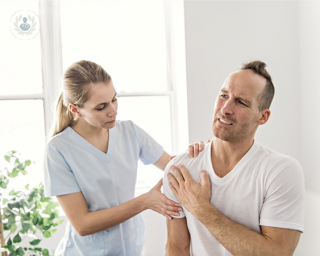

Brachialgia: how to treat a pinched nerve in the neck
By Mr David Bell
2025-02-05
Brachialgia is the technical term for arm pain and described as the upper body equivalent of sciatica. Much like sciatica, the onset can be sudden and unexpected. To understand it more, we spoke to Mr David Bell, a London-based neurosurgeon, who explained what causes it, the symptoms and the treatment options available. See more


How to treat a pinched nerve that’s causing neck, back and/or arm pain
By Mr Dimpu Bhagawati
2025-02-05
Mr Dimpu Bhagawati explains how a pinched nerve could be causing your neck, back and/or arm pain, as well as how it can be treated non-surgically and surgically See more
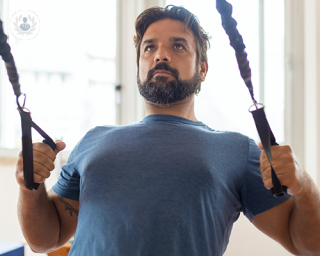

Optimising Rehabilitation After Arm Surgery: Tips for a Quick Recovery (Part 2)
By Professor Mohamed Imam
2025-02-05
Although arm surgery can significantly impact a patient’s daily life, quick and effective rehabilitation can help minimise this effect. Following on from the first part, Professor Mohamed Imam offers an expert insight into how to overcome the common challenges faced during rehabilitation and how the use of wearable devices can support the recovery process, in this conclusion of a two-part series of articles on rehabilitation after arm surgery. See more


Common causes of arm pain
By Mrs Anne Mitchener
2025-02-04
Do you suffer from arm pain? Read more from our expert neurosurgeon Mrs Anne Mitchener on the possible causes of the condition that may leave you with pins and needles and weakness when moving. See more
Experts in Arm pain
-
Mr David Bell
NeurosurgeryExpert in:
- Arm pain
- Vertebroplasty
- Spinal surgery
- Sciatica
- Neck pain
- Back pain
-
Mr Jonathan Bull
NeurosurgeryExpert in:
- Neck pain
- Back pain
- Arm pain
- Spinal stenosis
- Sciatica
- Minimally invasive spinal surgery
-
Mrs Anne Mitchener
NeurosurgeryExpert in:
- Neck pain
- Minimally invasive spinal surgery
- Back pain
- Lumbar herniated disc
- Sciatica
- Arm pain
-
Mr Amit Amit
NeurosurgeryExpert in:
- Arm pain
- Back pain
- Sciatica
- Spinal surgery
- Brain tumour
- Nervous system
-
Mr Iqroop Chopra
NeurosurgeryExpert in:
- Spinal surgery
- Arm pain
- Tarlov cyst
- Back pain
- Spinal fusion
- Minimally invasive spinal surgery
- See all

The Harborne Hospital - part of HCA Healthcare
The Harborne Hospital - part of HCA Healthcare
Mindelsohn Way, B15 2FQ
No existe teléfono en el centro.
By using the telephone number provided by TOP DOCTORS, you automatically agree to let us use your phone number for statistical and commercial purposes. For further information, read our Privacy Policy
Top Doctors

Central England Neurosurgery
Central England Neurosurgery
BMI Three Shires Hospital, The Avenue, Northampton
No existe teléfono en el centro.
By using the telephone number provided by TOP DOCTORS, you automatically agree to let us use your phone number for statistical and commercial purposes. For further information, read our Privacy Policy
Top Doctors

The Meriden Hospital - part of Circle Health Group
The Meriden Hospital - part of Circle Health Group
Clifford Bridge Road, Coventry
No existe teléfono en el centro.
By using the telephone number provided by TOP DOCTORS, you automatically agree to let us use your phone number for statistical and commercial purposes. For further information, read our Privacy Policy
Top Doctors
-
The Harborne Hospital - part of HCA Healthcare
Mindelsohn Way, B15 2FQ, BirminghamExpert in:
- Digestive
- Cancer
- Orthopaedic surgery
- Thoracic Surgery
- Diagnostic Imaging
- Obstetrics and Gynaecology
-
Central England Neurosurgery
BMI Three Shires Hospital, The Avenue, Northampton , NorthamptonExpert in:
- Neurological spinal surgery
- Orthopaedic spinal surgery
- Spine
- Neurosurgery
- Spinal trauma
- Brain and spinal tumours
-
The Meriden Hospital - part of Circle Health Group
Clifford Bridge Road, Coventry , CoventryExpert in:
- Cancer
- Cardiology
- Colorectal surgery
- Shoulder surgery
- Hand surgery
- General Surgery
- See all
- Most viewed diseases, medical tests, and treatments
- Osteoporosis
- Trigeminal neuralgia
- Narcolepsy
- Alzheimer's disease
- Cluster headaches
- Tension headache
- Chronic headache
- Ulnar nerve entrapment
- Peripheral nerve block
- Peripheral neuropathy
